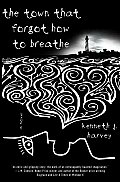
| Publisher: | St. Martin's |
| Copyright: | 2003 |
| Printing: | October 2005 |
| ISBN: | 0-312-34222-5 |
| Format: | Hardcover |
| Pages: | 471 |
A father, estranged from his wife, takes his daughter on a vacation to the small town on the Newfoundland coast where his family lived. When he arrives, though, he finds that very strange things are going on. His daughter is seeing a girl who lives next door who is apparently dead. A mysterious illness is sweeping the town, leaving people unable to take a breath. And very strange things are starting to happen in the harbor and sea.
In his US publishing debut, Canadian novelist Kenneth J. Harvey blends multiple genres and story approaches in a story that is determinedly elusive about what direction it's coming from. At first, it feels likely to become a horror novel: the ghosts are not friendly and frequently disgusting, dead bodies are rising out of the sea, people are going crazy before they forget how to breathe, and the next-door neighbor is straight out of a gothic romance. However, the story never becomes truly frightening. The elderly and very practical Miss Laracy serves as an imperturbable guide and blunts much of the creepiness of what happens, and the characters start developing an understanding of what's going on and why. The presence of second sight, spirits with family connections, and the sea as a spiritual source shifts the story towards a fantasy with some magic realist tendencies. And yet, the emotional concerns of the characters are very mainstream, focused on recovering a failed marriage, dealing with jealousy and misunderstanding, remembering one's culture, and staying in touch with the past.
Sometimes this sort of novel manages the perfect blend of the strengths of several different genres. Unfortunately, in this case, I felt like the different themes were struggling against each other more than cooperating. I could never shake the impression that there were three books happening at the same time and stealing the limelight from each other, resulting in an unsatisfying and too muted horror novel, a fantasy novel that never reaches adequate explanation or resolution, and a mainstream novel that's overshadowed by all the other things that are going on. I wanted to care about Joseph's marriage and his relationship with his daughter, and it does reach something of a resolution, but by doing so in the middle of mostly unrelated revelations about the fantasy plot it lacked much emotional punch.
Of the three novels, my favorite was the fantasy. Harvey handles both prognostication and second sight (seeing spirits and auras) quite well. He grounds the story firmly in small town life, which lets the fantasy stand out and baffle and confront people. I liked the way spirits interacted poorly with modern technology and the involvement of the military in attempting to control and understand the epidemic of breathlessness added a nice touch of X-Files creepiness. Unfortunately, while most of the story seems to be building up to revelations and understanding, the end of the book slips away and leaves the central mysteries of what had been happening almost entirely unexplained. We never really understand why this happened to this town when it did, or quite what is out to sea, and I could have used a bit more clarity in the explanations we did get.
Most of the emotional power could have come from Joseph, his daughter Robin, and his estranged wife. There certainly is enough material there to pull the reader in and have us on the edge of our seats hoping that everything will work out for the family. Unfortunately, the emotions get derailed by other weirdness whenever they get started. Joseph spends a substantial portion of the middle of the book completely out of his mind, in scenes that are mostly annoying to read, and by the end I was frustrated and disgusted with him for his obsession with the gothic woman next door that's poorly defended beyond a lust-at-first-sight narrative assertion. His wife, on the other hand, misses the fact that he's out of his mind for much of the book, and too much of the conclusion involves everyone being furious with him for things that are entirely not his fault. The family reunion coming out of that emotional context just didn't do anything for me.
There are good ideas here and some memorable characters, but this book drifts too much. The plot moves at a meandering pace, there are a few too many detailed descriptions and mood-setting scenes that serve little point in the narrative, and none of the three stylistic threads of the book achieve much momentum or emotional punch. Harvey does do an excellent job at creating the background of Newfoundland small-town life, creates a few intriguing characters, and clearly is a talented and capable writer, but for me The Town That Forgot How to Breathe was fundamentally unsatisfying.
Reviewed: 2005-11-27